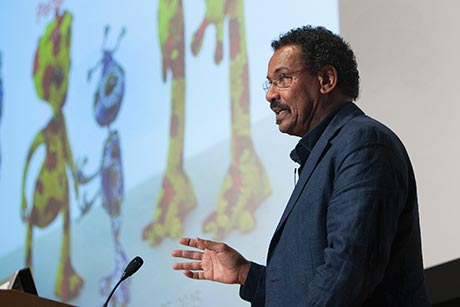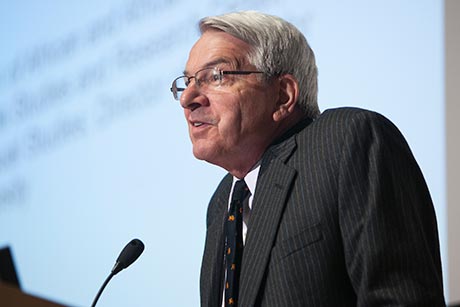Scholars cite role of Cornell in humanities transformation
By Daniel Aloi


Four scholars with Cornell connections looked at fundamental changes in humanities teaching, research and subject matter at a Charter Day Weekend panel April 25, “Revolution in the Humanities in the Last 50 Years.”
From opening canons to different voices and genres to creating new fields of study defined by social identity, humanists have sought not only to understand the world but to change it – through new theories of language and consciousness, studies of new media, expression and communication, and entire areas of research based on gender, race, ethnicity, class, and personal and cultural history.
Highlighting challenges and transformational changes in the humanities at Cornell, in higher education and in their fields were faculty members Jonathan Culler and Salah Hassan; Columbia University professor Gayatri Spivak, M.A. ’63, Ph.D. ’67; and Don Randel, emeritus professor and former Cornell provost and dean of the College of Arts and Sciences.
Randel, the Given Foundation Professor Emeritus of Musicology, reflected on Cornell as an early haven for progressive scholarship in musicology, edging the discipline away from narrowly proscribed historical studies – or “the canon of acceptable dissertation topics.”
When he was editor of a journal in the 1970s, “over half of what we received was about music before 1600,” Randel said. “Music lagged behind the other arts, and it took a long time to shed those particular roots,” and embrace other genres such as jazz and popular music, and performance studies.
His Cornell colleagues led the way, he said, citing William Austin’s “unprecedented” course Bach, Rock and Folk; Neal Zaslaw’s research on historic performance practice and Malcolm Bilson’s use of period-appropriate keyboard instruments to explore the music of Haydn and Mozart.
“I learned an immense amount,” Randel said. “There was, and still is, a lot of fresh air blowing through Cornell than through those places we play football against.”
Culler, the Class of 1916 Professor of English and Comparative Literature, covered a number of developments initiated at Cornell since the 1960s, which he attributed to expansion to include women’s studies, gay and lesbian studies, African-American and Native American studies; and in methods of study.
These changes “were seen as a threat to Western culture, patriarchy and sexuality,” he said.
M.H. Abrams’ Norton anthology, Culler said, “was a pioneer in canon-forming anthologies, adding more women and minority authors in each of its editions, and expanding the Anglophone canon [for] students all over the world.”
Culler emphasized contributions by other Cornell scholars including government professor Benedict Anderson, whose 1983 work “Imagined Communities” assessed cultural factors in creating communities and national identities; the Diacritics journal begun by Philip Lewis and David Grossvogel in 1970; the Society for the Humanities’ annual focus on new areas of inquiry since the 1980s; alumna and Mellon fellow Eve Sedgwick, who pioneered queer theory; and research by David Bathrick, Biddy Martin and Cathy Caruth.
Hassan, the Goldwin Smith Professor of African and African Diaspora Art History and Visual Culture, said that the broader changes in the humanities affected his own life and work. When he began his career, “the challenge for me as a so-called non-Western scholar was the entrenched Eurocentrism in majors and assigned textbooks.”
He showed images of contemporary African art, saying, “These artists remain particularly conscious of racial classification,” migration and other issues, and those concerns are reflected in current teaching.
In defending the humanities, Spivak said they “will never be a cash cow, but in fact they are health care for the culture … resources for the humanities should be protected as such.”
Culler reinforced the “notion of humanities as a good vocational education,” saying that “businesslike skills – writing reports, synthesizing information, sitting in meetings and trying to persuade other people that your ideas are good ones – are the kinds of skills that are gained in humanities courses.”
Media Contact
Get Cornell news delivered right to your inbox.
Subscribe